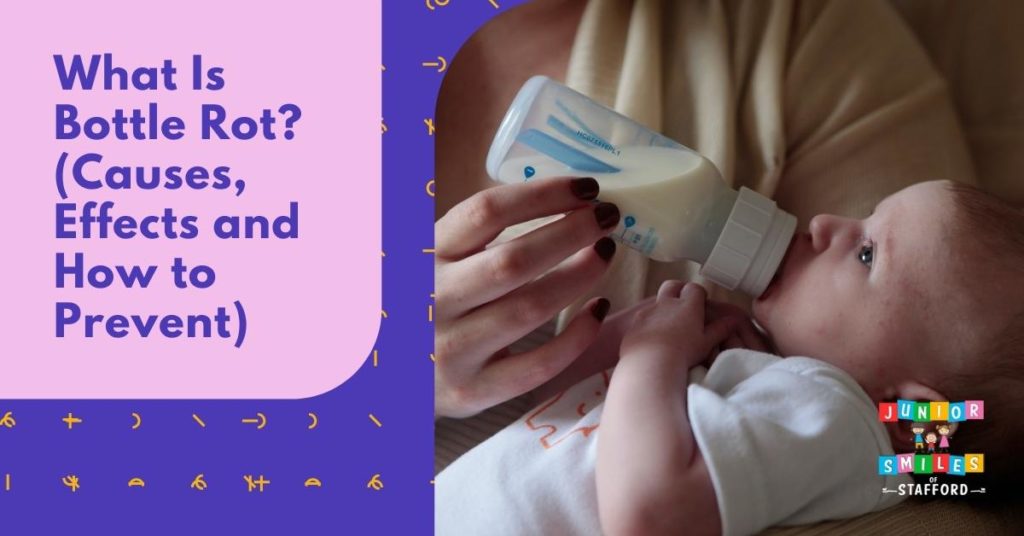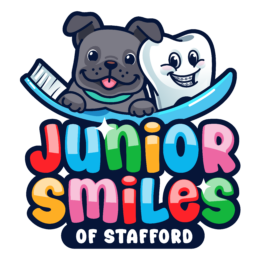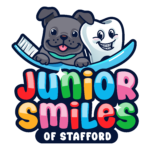What Is Bottle Rot? (Causes, Effects and How to Prevent)

Healthy baby teeth are a must, even though it’s temporary. Baby teeth are more sensitive than adult teeth, so they are more likely to get cavities. Baby Bottle Tooth Decay or Early Childhood Caries are terms used to describe tooth decay in infants and toddlers. Untreated tooth decay may cause further oral health issues.
This article will be your guide throughout bottle rot.
What Is Bottle Rot?
Bottle rot (also known as baby bottle tooth decay) occurs when a child experiences build-up of bacteria around their baby teeth. Your child can experience tooth decay when exposed to acidic beverages like juice and milk for an extended period. Aside from affecting your child’s baby teeth, bottle rot is a serious issue. It can have a long-term effect on the structure and function of their adult teeth.
Please note that while this condition may mostly affect your child’s upper teeth, it could also affect other teeth.
What Causes Baby Bottle Syndrome?
If bottle rot is left untreated, you could put your child at risk. Here are some causes of this dental health condition:
Sugary Drinks
Bacteria love sugar because it provides the perfect habitat for them to flourish in the mouth. Acids produced by dangerous bacteria can damage your child’s teeth. You must keep your child away from sweetened drinks such as fruit juice, milk, or syrups. Moreover, your child’s teeth are at increased risk of decay if compromised tooth enamel.
Prolonged Bottle Use
Bacteria that can cause cavities and decay are more likely to form in children’s teeth if they are regularly exposed to sweets.
Cleaning Baby Items With Mouth
The bacteria that cause tooth decay can be transferred from the mother or babysitter to the baby, resulting in tooth decay. The saliva carries these germs. You can transfer bacteria to the newborn if you clean your baby’s feeding spoon or pacifier using your mouth.
Signs of Baby Bottle Tooth Decay
Early signs of baby bottle tooth decay include white spots on the surface of the teeth or along the gum line and tooth sensitivity and pain. When white spots on the enamel become common, you can use fluoride to treat the problem, along with a reduction in sugar intake and proper oral hygiene.
Untreated tooth decay may develop, and fluoride won’t be enough to treat it. Here are the symptoms of more severe tooth decay:
- Bleeding or swollen gums
- Bad breath
- Fever or irritability
- Brown or black spots on the teeth
If your kid experiences any of these symptoms, it would be best to schedule a dentist appointment right away. Neglecting the condition could lead to tooth loss.
How To Prevent Baby Bottle Tooth Decay
Keeping your child’s teeth healthy is the best way to prevent or reduce the risk of tooth decay.
Practice Good Oral Hygiene
You can use a clean gauze pad or rag to clean your baby’s teeth. Find out if you need to take fluoride supplements if your water doesn’t have it. Moreover, brush your baby’s teeth without toothpaste from the first tooth. If you must use toothpaste, choose fluoride-free. When two teeth meet, start flossing. It would be best to regularly schedule dental checkups for your child when their first tooth shows.
Proper Oral Care During Pregnancy
As an incoming mom, remind yourself never to neglect your oral health. Eat nutritious food, and practice proper oral care. You must know that your child’s tooth decay risk increases when you have untreated tooth decay. To prevent that, you should practice good oral hygiene, including brushing twice a day, flossing every night, utilizing fluoride, and regular dental visits.
Clean Your Baby’s Gums
Infected tooth decay is less likely to occur after the first set of infant’s teeth; this is why cleaning your baby’s gums is important. It also helps the infant get used to having a parent clean their mouth daily, which is a good habit of getting into early on. For at least two weeks before the first baby tooth appears, parents should use a washcloth to scrub their infant’s gums gently. This guarantees that the mouth is free of bacteria and carbohydrates.
Read More: When Should I Take My Baby to the Dentist?
Why Choose Junior Smiles of Stafford?
Our Stafford, VA team is well-versed in working with clients of various ages and backgrounds. They’ll take the time to get to know you and your family’s requirements, and they’ll work with you to design a treatment plan that suits your schedule. Sealants and fluoride treatments are just two of the many preventative care options we provide to keep your mouth healthy.
About Us
Visiting Junior Smiles of Stafford means you’re in good hands when it comes to receiving high-quality care. Your child’s dental health improves with each visit, ensuring a brighter smile for years to come. We adhere to the ADA and AAPD’s guidelines for best practices.
Where Are We Located?
Phone: (540) 699-2441
Fax: (540) 699-2464
Email: info@juniorsmilesofstafford.com
Monday and Tuesday: 9:00 AM – 5:00 PM
Wednesdays and Thursdays: 8:00 AM – 4:00 PM
Fridays and Saturdays: 9:00 AM – 2:00 PM (By appointment only)
How to Book Your Kids First Appointment at Junior Smiles of Stafford
Fill out the form on our website. Within 24 hours, a member of our team will get back to you.

